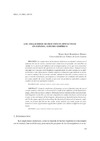Identificador persistente para citar o vincular este elemento:
https://accedacris.ulpgc.es/jspui/handle/10553/59276
| Campo DC | Valor | idioma |
|---|---|---|
| dc.contributor.author | Rodríguez Medina, María Jesús | en_US |
| dc.date.accessioned | 2019-12-17T20:22:14Z | - |
| dc.date.available | 2019-12-17T20:22:14Z | - |
| dc.date.issued | 2002 | en_US |
| dc.identifier.issn | 1885-9089 | en_US |
| dc.identifier.other | Dialnet | - |
| dc.identifier.uri | https://accedacris.ulpgc.es/handle/10553/59276 | - |
| dc.description.abstract | Los anglicismos de frecuencia sintácticos en español consisten en el aumento del uso de ciertas construcciones sintácticas (el gerundio, los adverbios en -mente, la voz pasiva) por influencia de la lengua inglesa, en la que estas estructuras presentan una frecuencia de aparición en el discurso mucho mayor Aunque Lorenzo introdujo este concepto en la lingüística española desde los años sesenta, no se habían llevado a cabo, basta ahora, estudios empíricos exhaustivos que midieran su alcance real en español. En el presente artículo, además de describir el marco teórico en que se inserta el fenómeno, presentamos y comentamos los resultados del análisis de un corpus amplio de casos, basado en una serie de parámetros aplicables a futuros estudios en diversas tipologías textuales. | en_US |
| dc.language | spa | en_US |
| dc.relation.ispartof | RAEL. Revista electrónica de lingüística aplicada | en_US |
| dc.source | RAEL: revista electrónica de lingüística aplicada [ISSN 1885-9089] (1), p. 149-170 | en_US |
| dc.subject | 57 Lingüística | en_US |
| dc.subject.other | Anglicismos sintácticos | en_US |
| dc.subject.other | Sintaxis inlgesa | en_US |
| dc.subject.other | Sintaxis española | en_US |
| dc.subject.other | Syntantic anglicisms | en_US |
| dc.subject.other | English syntax | en_US |
| dc.subject.other | Spanish syntax | en_US |
| dc.title | Los anglicismos de frecuencia sintácticos en español: estudio empírico | en_US |
| dc.type | info:eu-repo/semantics/article | en_US |
| dc.type | Article | en_US |
| dc.identifier.url | http://dialnet.unirioja.es/servlet/articulo?codigo=1325310 | - |
| dc.description.lastpage | 170 | - |
| dc.identifier.issue | 1 | - |
| dc.description.firstpage | 149 | - |
| dc.investigacion | Artes y Humanidades | en_US |
| dc.type2 | Artículo | en_US |
| dc.contributor.authordialnetid | 170379 | - |
| dc.identifier.dialnet | 1325310ARTREV | - |
| dc.identifier.ulpgc | Sí | es |
| dc.description.esci | ESCI | |
| dc.description.erihplus | ERIH PLUS | |
| item.grantfulltext | open | - |
| item.fulltext | Con texto completo | - |
| crisitem.author.dept | GIR Estudios sociolingüísticos y socioculturales | - |
| crisitem.author.dept | Departamento de Filología Moderna, Traducción e Interpretación | - |
| crisitem.author.orcid | 0000-0002-1928-8839 | - |
| crisitem.author.parentorg | Departamento de Filología Moderna, Traducción e Interpretación | - |
| crisitem.author.fullName | Rodríguez Medina, María Jesús | - |
| Colección: | Artículos | |
Visitas 5
307
actualizado el 10-ene-2026
Descargas
261
actualizado el 10-ene-2026
Google ScholarTM
Verifica
Comparte
Exporta metadatos
Los elementos en ULPGC accedaCRIS están protegidos por derechos de autor con todos los derechos reservados, a menos que se indique lo contrario.
